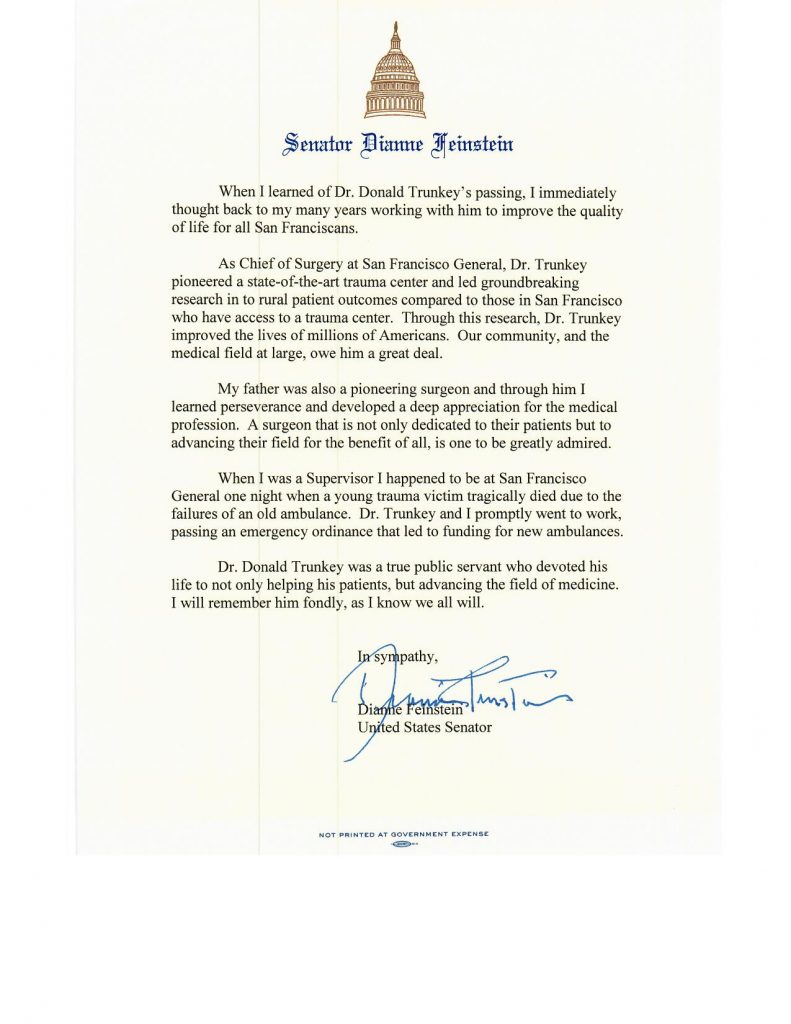
A true public servant by Senator Dianne Feinstein


It has taken time to write about Don. When he started to decline mentally, it seemed incomprehensible that this great man would come to a disease that would strip away his mind. For it was his intellect that defined Don’s professional life and delivered the influence he had on the world. My father, decades ago, suffered the stages of dementia and Dad’s four-year decline was intensely painful. To know how Don’s remaining years might proceed crushed my heart.
It is difficult to put into words a description of Don Trunkey. For Don Trunkey was in a category all his own—a man of utmost integrity, a person who had all the gifts that could guide, advise and lead during the good times, and especially when paths had not been travelled and answers remained hidden. Dr. Trunkey was the consummate professional: ethical behavior beyond reproach, altruistic to the core, constant intellectual development, committed to his convictions, with superb emotional intelligence and an inability to compromise his values. He was serious and strong, not arrogant, rather humble, and he constantly displayed a sense of enjoyment and fun about life and for the people he served and loved. He was “called” to the profession of medicine and sought to improve the health of others by perpetually elevating the care of the injured. He was a visionary, counselor, leader, physician, surgeon, righteous citizen, patriot, confidante to many and the most impactful trauma surgeon of our time.
I don’t how, why or exactly when Don and I became good friends. Regardless, for some thirty years we were the best of friends. We rarely talked business even though we traveled together a great deal, vacationed with our wives and, if time sped on without talking, with no regard for time zone or , continent, a phone call came about. Our Sun Fun group with Tommy Thompson, Lew Flint and Kim Maul kept the five couples together. Always a gathering in mid-winter, on a Caribbean island and a few rules: no business allowed, great music and entertainment, fabulous meals, and a little fine wine was a part of the glue. These gatherings were hilarious and an annual recharging of the energy cells of our bodies, minds and souls. Don and I were hikers and over thirty years we probably hiked thousands of miles. one on one. Those times were precious. Margie and Jane were great friends and as a traveling foursome, our trips were adventurous and memorable. We enjoyed each other’s company and our senses of humor and love of the comedy in life were lifelong bonds. Many, many tears were shared; most were from laughter, some from sorrows. Friends for life.
I see today what I most admired about Don, both his gentleness and strength, easygoing joy and stubborn tenacity for issues he strongly believed. He was a wonderful older brother, a navigator of my life and gently turned my compass a few degrees, and without my knowing the change in direction was taking place. He was beyond a friend and a precious gift in my life. Thank you, Don.
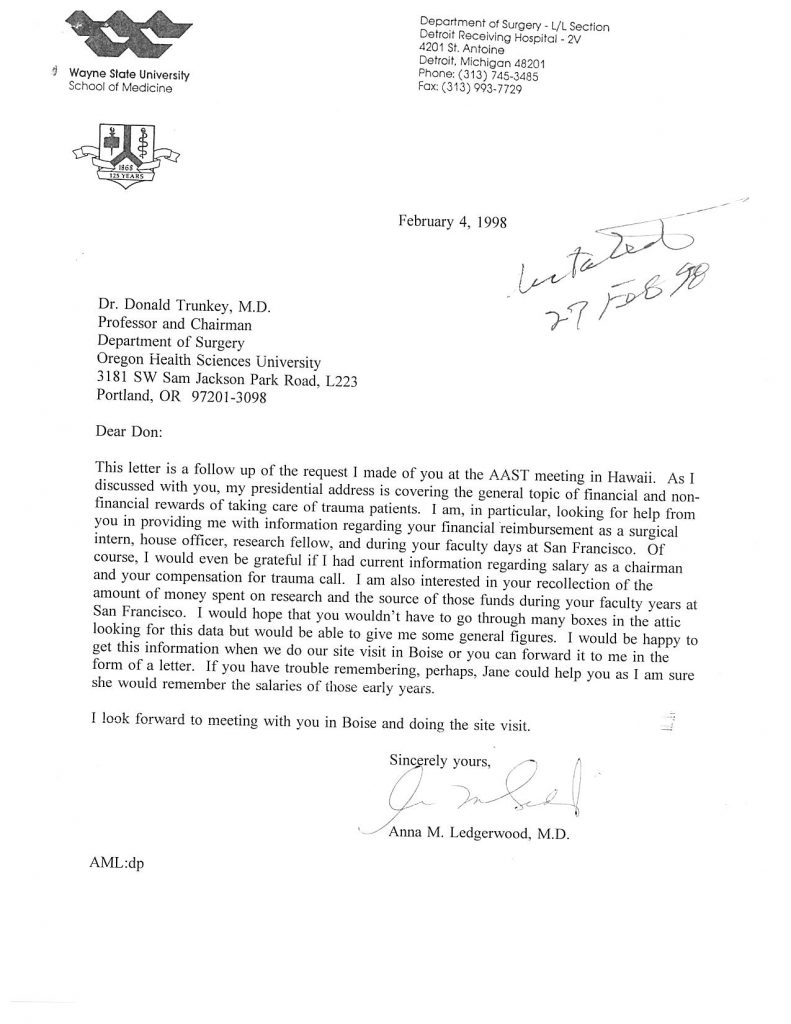
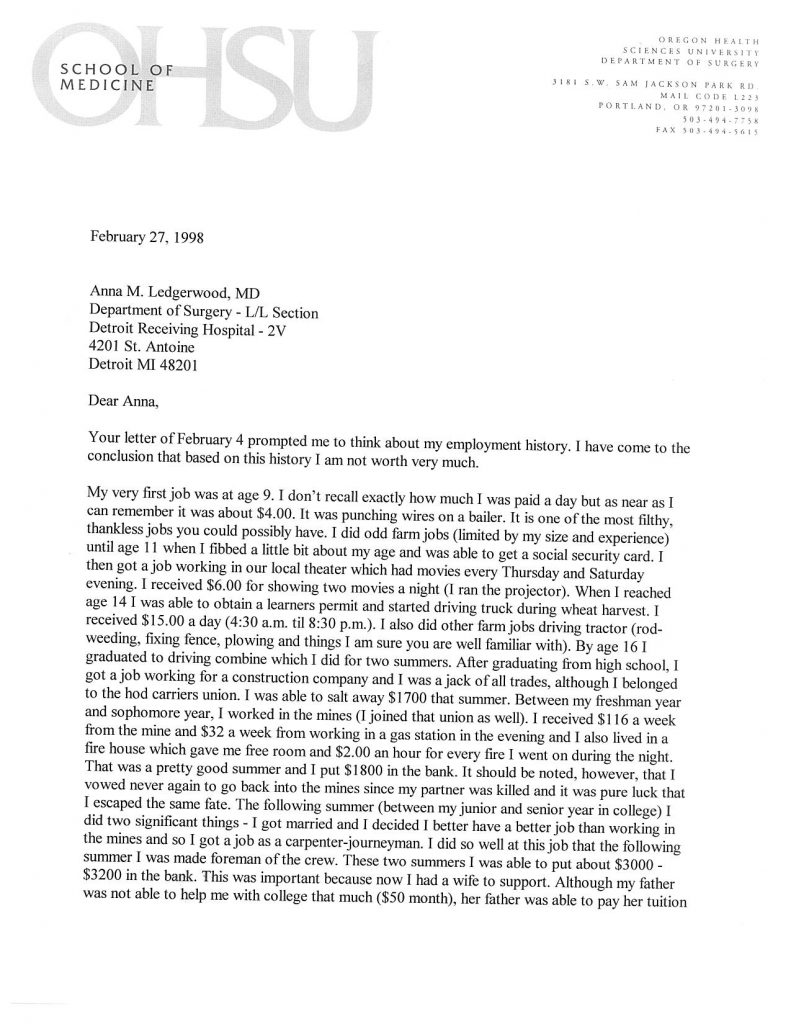
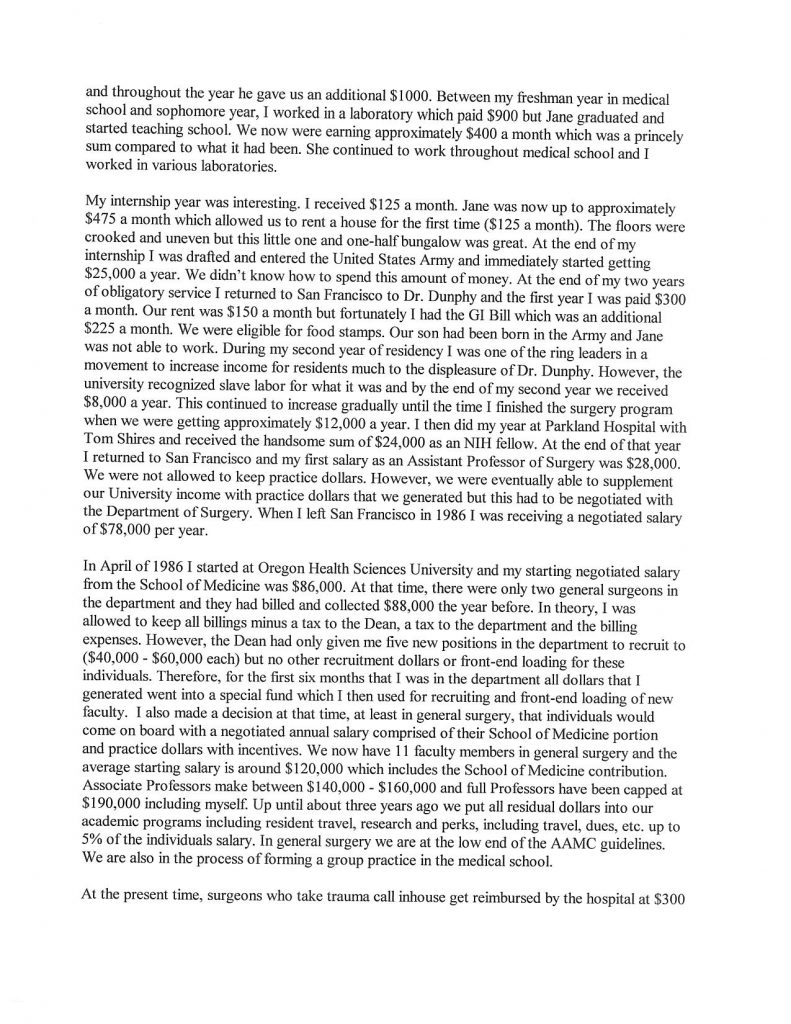
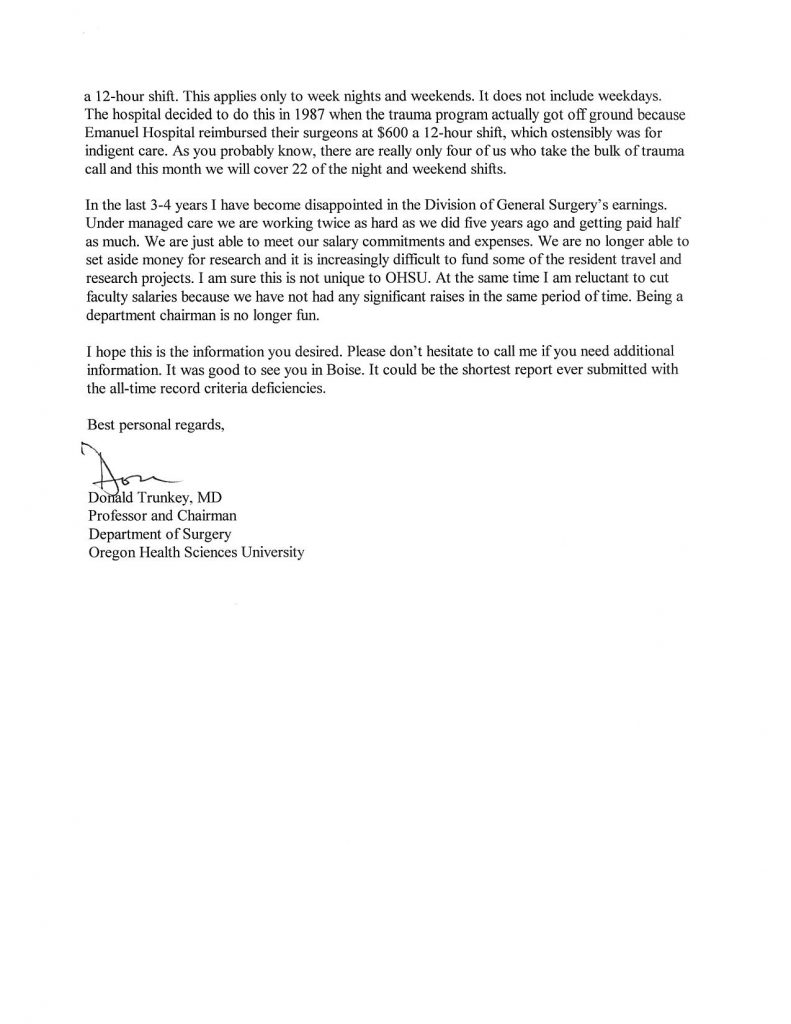
As the pearly gates swung open on May 1, 2019 and Donald Trunkey strode through, head held high, wry smile on his face – I am certain that St. Peter stood, offered a crisp salute and yielded his post. That’s because everywhere Donald Trunkey went, he was, by the sheer power of his personality and intellect, totally, completely and unequivocally in charge. His natural charisma, quick wit and his high-minded values made him beyond formidable. Everyone wanted to be around him. Everyone wanted to be like him. Everyone wanted to be him. He was a force for good.
He was in a category all his own – a man of utmost integrity – I’ve met no other single human being more capable of leading a righteous cause, the right way, for the right reason. Not only did Donald Trunkey change the national consciousness regarding care of the injured patient – and in the process save the lives of thousands upon thousands, he brought generations of surgeons, nurses and medics along with him on the journey. I know because I was one of them. If you were to ask him why, he would have quickly served up a humorous quip and likely never answered the question. But in the exchange, you would have garnered the answer – because it was the right thing to do. He was a force for good.
He had intensity without tenseness and a powerful mind without an ounce of arrogance or guile. When Donald Trunkey spoke, everyone listened. An autodidact with far reaching intellectual curiosity across a broad range of topics, he had the unique capability of captivating those around him with his skills as a raconteur and the practicality of his approach. After having met Donald Trunkey some years before while working with my mentor, Bill Schwab at the University of Pennsylvania, I vividly remember receiving an unexpected phone call from him in 1997. It’s hard to describe the feeling in those brief seconds between the moment my assistant informed me of the call and the moment I heard his voice. But I can still feel it now as I recount the story. It was as if I knew something really important was about to happen. Dr. Trunkey told me that there was a hospital in eastern North Carolina looking for a new Chief of Trauma. He told me that they were sincerely committed to building the center and the surrounding trauma system. They needed leadership and he urged me to go and visit and consider it. He also made it clear that the people who lived there needed help and that the mortality rates were inordinately high for injured patients. With no expectation of ever actually going to such a place, I respectfully followed Dr. Trunkey’s recommendation, interviewed for the job and well, as you might expect, took the leap of faith that he proffered. I left Penn, went to East Carolina University and for the next 14 years, endeavored to follow in his footsteps and change the fate of injured patients in that corner of the world. He was a force for good.
What can we do when these sorts of monolithic characters move on to otherworldliness? How can we express all that they have meant to us? How do we explain to those around us how they have changed our lives and, in this case, saved countless lives? To me, the answer is simple: live as he lived. Do right as he did right. Carry the mantle for those who cannot carry it themselves. And work as Donald Trunkey worked because he truly was – a force for good.
I first had the pleasure of meeting Don when we introduced ATLS® to the west coast in 1981. I was a community surgeon interested in the task of improving the early care of the trauma patient. Don, at that time was already an experienced trauma surgeon on his way to becoming an icon in trauma and American surgery. He accepted the ATLS® approach with his full commitment without any undue criticism as many of his peers did initially.
My interactions with Don became quite frequent when he became chair of the American College of Surgeons Committee on Trauma (COT). We became well acquainted at the various meetings we attended together during his tenure as the COT chair. He never lost his enthusiasm for teaching all who participated in the care of the trauma patient. We came to learn that our childhoods and values were very similar having been raised in rural America not being stymied by hard work to reach our goals.
The unselfish dedication and commitment of his professional career to the improvement in the care of the injured patient; his clairvoyant incorporation of the concepts of preventable death methods and evidence-based practice in support of trauma systems: his initial investigations of cellular response to injury; his élan as an educator, role model and friend to countless surgical trainees; his unpretentious personality; and his exemplary compassion in the care of the injured patient will always remain as standard for the trauma surgeon.
I am proud to have known him for over 30 years.
Paul “Skip” Collicott
It’s been more than 30 years since Dr. Trunkey saved my younger brother’s life. James was barely 21 when a young man he’d never met before shot him in the neck over a foolish matter. Our local doctor in that small Oklahoma town packed him in an ambulance and sent him to Wichita, Kansas, 60 miles away. He thought the bullet could have hit an artery and that James would need an arteriogram.
He never got one. When James turned 21, My dad’s insurance no longer covered him. The surgeon told James the procedure was too expensive and that he’d send some medical students around to look at him. He’d be fine. He told James it was one of the few bullet wounds that could be taken care of with just a bandage.
A few months later, James, a mechanic, reached up to work on a car that on a lift above him. His arm went numb and he could barely move it. The doctor at the emergency room of the local hospital said it was extremely likely to be related to the gunshot wound. He told James he needed to go see the surgeon who’d seen him in Wichita. That doctor told James to come see him on Monday, three days later. James felt powerless. One doctor said it was outside his expertise and the “expert” said, “See you in three days.”
Three days later James’ arm was horribly swollen. Emergency surgery was performed to remove 11 blood clots from his arm and to repair an aneurysm the size of a hen’s egg on his brachial artery under the collar bone.
Why give all these details about James’ history? To demonstrate the difference between a real doctor and, by my definition of a doctor, a fake. Real doctors can be busy, even gruff, but they respect you. They make sure you get the information you need to make decisions. They always, always try to save your life and THAT always comes first.
I asked James to come stay in San Francisco with me my husband, Lee Henry. He started a job but called soon after starting it to tell me something was wrong. Lee told him to go to San Francisco General Hospital because he had a cousin working there and they accepted patients without insurance.
This is when Don Trunkey saved James’ life. With another surgery on the damaged artery, yes, but there were several more of those in the following years. It was by treating him with kindness and respect. It was by giving James the information he needed no matter how depressing or negative it might be. James’ prognosis was very worrisome, but Dr. Trunkey was honest. He was assigned to James by sheer luck, and James certainly got the best surgeon one could get. Dr. Trunkey successfully operated on James, but he also got down into the weeds about how James got into the predicament he was in. He asked James about seeing the initial angiogram because he saw that as standard treatment and found out there was none.
Some people may not like to hear about medical malpractice lawsuits. I’m sure many are frivolous. But James has suffered through seven major surgeries, including grafts taken from both legs to replace the latest failed repair on his artery. James moved back to Oklahoma and soon needed another repair operation. Dr. Trunkey graciously referred him to a doctor in Dallas he trusted. I know that Dr. Trunkey saw James as a young man who had been harmed by callous disregard. He saw him as a vulnerable young kid who needed care and simply did not get it. The results were years of surgeries and fear of the next one.
James did get a lawyer. He did sue the original doctor who told him an arteriogram was too expensive for a little gunshot wound. After many years he won, in part because of Dr. Trunkey’s testimony that an arteriogram is standard procedure on a case such as James’.
James has gone on to live a full life. He has four children and grandchildren. He loves to fish, he still works as a mechanic, but he will not be able to have another artery repair. The artery is too fragile. He knows from his doctors what the eventuality is. But he’s at peace with that.
My whole family will always be grateful to Dr. Trunkey, a real doctor. I saw him several years after James left San Francisco at a fancy social affair and he asked me how James was doing. His face showed care and concern. That face that will stay in my memory as long as I live.
Don Trunkey was a trailblazing pioneer for patient care, trauma management and educating multiple levels of trainees in surgical management. I first had the pleasure of meeting Don in the mid 1970s when I was directing EMS for Boston and Boston City Hospital.
He came and site visited the Trauma Center and insisted on spending time observing the Emergency Medical System both in the prehospital phase as well as in the Trauma Center.
This was a particularly challenging time since paramedics and emergency prehospital care were in their infancy. He was so helpful both in concept and in detail as to how the system could be improved. He took the time to meet everyone and was particularly kind to me in those early days. He was particularly helpful in persuading the Commissioner of Health and Hospitals on the importance of physician led medical direction and medical control of the system.
The very next year he invited me to join the Committee on Trauma and paired me with Norman McSwain. His ability to include everyone both professionally and socially had an indelible effect on me. His straightforward no nonsense attitude coupled with an incredible sense of humor and the willingness to include young surgeons in the decision making process has stayed with me forever.
He was always open to ideas and encouraged younger people to present their ideas and concepts at the national level. As you can imagine this was intimidating for a young surgeon to be asked to present somewhat new and different ideas before the icons of trauma surgery. He would always give encouragement and constructive criticism which improved the concept and ultimately it’s implementation.
He taught me the importance of knowing every single detail of a new initiative or program. Then being prepared to fearlessly defend it with the use of data and good humor.
He championed so many positive concepts that have dramatically improved trauma care in the United States and in the world.
The ATLS program, trauma center verification, trauma system implementation, modernization of battlefield care, the inclusion of younger people on on numerous trauma committees which allowed them to learn the process and spend a lifetime in trauma care.
I think his ultimately legacy was that he always wanted to do the best thing for the patient and his willingness to be a fearless mentor for countless younger surgeons myself included. I will miss his leadership and friendship terribly.
Lenworth Jacobs MD, MPH, FACS
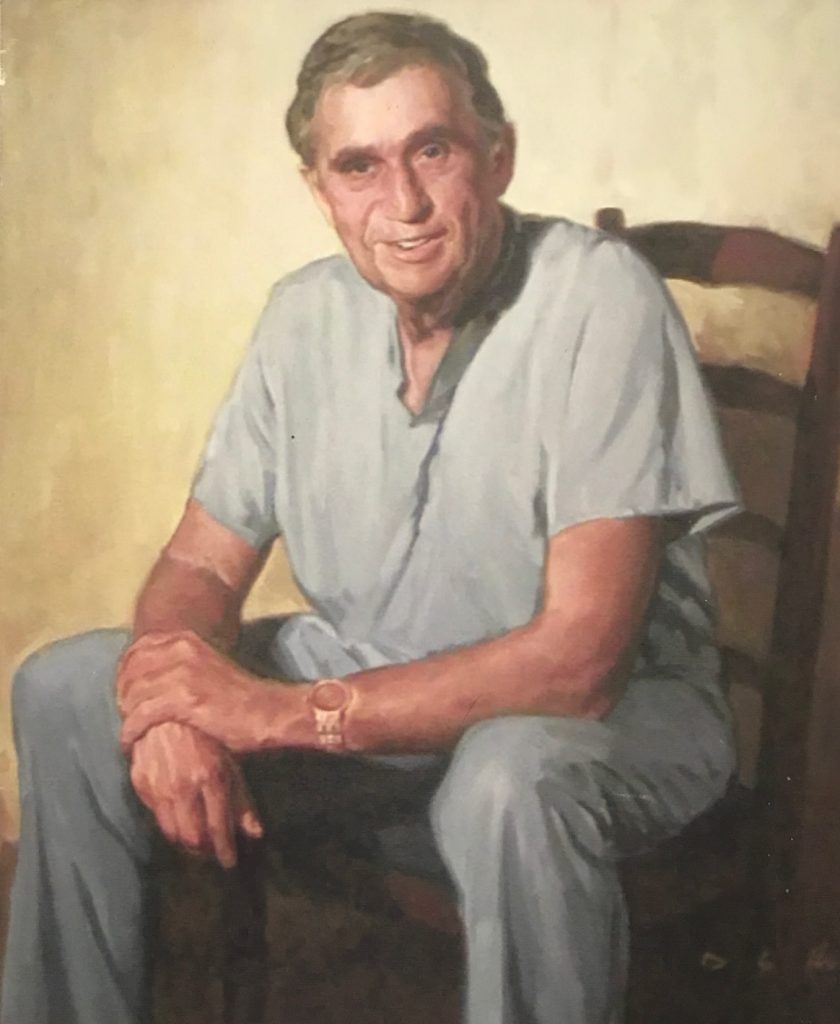
Don Trunkey
1937 Born Oakesdale, Washington
1946 First Operation, Castration of pig
1955 Saint John HS
1958 Married Jane Henry
1959 Washing State College BS in Zoology, Also played basketball
1963 University of Washington MD
1964 Oregon Health Sciences University internship
1964 Drafted US Army, Nuernberg Germany
1966 University of California San Francisco, Residency
1971 Parkland Trauma Service, Trauma Fellowship
1972 University of California San Francisco, San Francisco General, Faculty
1978 University of California San Francisco, San Francisco, General Chief of Surgery
1985 Joined US Army Reserve
1986 Oregon Health Sciences University Chief of Surgery
1991 Desert Storm 50th General Hospital and After Action
2001 Oregon Health Sciences University Professor Emeritus
2006 Rotations to Landsthul Germany to relieve Army surgeons so they could visit home
2018 Moved to Idaho
Not commonly known about Don:
As a teenager Don shot squirrels for farmers and was paid 5 cents per tail. 22 ammo cost 2 cents so he became a good shot.
In High School he worked at a machine shop welding farm equipment and as a projectionist where he often fell asleep and had to be woken to change the reels.
He met my mom by repeatedly breaking his nose in HS sports which was set by Jane’s father. They also saw each other when St. John played Colfax in basketball and at barn dances.
He worked in mines in Montana during the summer in college to make money. He saw his first death on the first day of the job after a minor cave in.
He caught the biggest trout of his life fly fishing in New Zealand (about 24 inches).
He was an excellent cook.
His mom played college tennis and was 5’11”. Her family goes back to the Mayflower.
His 5th time great grandfather fought in the French artillery at Yorktown and deserted rather than go back to France.
He made his own wine with cousins and doctors and won a silver metal in the Oregon State Fair for Piot Noir (a competitive category)
He was in Tiananmen square the night before the 1989 incident talking to the protesters.
He also did historical research of surgery including Presidential assassinations and the Lewis and Clark Expedition
References
https://en.wikipedia.org/wiki/Donald_Trunkey
https://dontrunkey.com/
https://www.youtube.com/watch?v=vVN0laPGF24
https://kingfaisalprize.org/professor-donald-d-trunkey/
https://www.ohsu.edu/…/surgery/about/donald-trunkey-lecture…
http://archiveswest.orbiscascade.org/ark:/80444/xv64010
https://sfgh.surgery.ucsf.edu/…/234…/history%20of%20sfgh.pdf